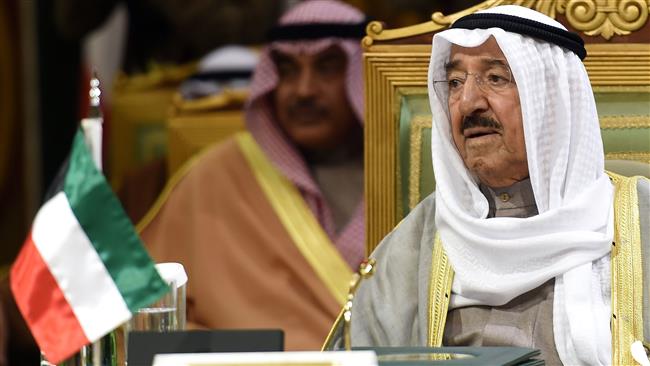Alwaght- Kuwait's Emir was in Saudi Arabia on Tuesday for a short visit during which he held talks with the Saudi King amid an escalating crisis between some Arab countries and Qatar.
There were no details of the meeting between Saudi King Salman and the Emir of Kuwait, Sheikh Sabah Al Ahmad Al Sabah, who flew to Jeddah in a bid to mediate an end to the diplomatic standoff.
Sheikh Sabah flew out of Kuwait City on Tuesday afternoon, heading for Jeddah in what his court described as a “brotherly visit.”
Earlier, Qatari Foreign Minister Sheikh Mohammed Bin Abdulrahman Al Thani said it had agreed to have Kuwait try to mediate the crisis, which erupted on Monday after Saudi Arabia incited Bahrain, Egypt, and the UAE to cut diplomatic relations with Qatar. The Maldives and Libya's eastern-based government followed suit later Monday. Jordan downgrades diplomatic relations with Qatar on Tuesday.
The countries cited Qatar’s relations with Iran and what they say is Qatar’s support for extremist groups such as Hamas, Muslim Brotherhood and al-Qaeda, as well as the Muslim Brotherhood.
Saudi Foreign Minister Adel al-Jubeir told reporters in Paris on Tuesday that Qatar must sever ties with Hamas and its historic parent, the Muslim Brotherhood.
Hamas said in a statement early on Wednesday that al-Jubeir's remarks "constitute a shock for our Palestinian people and the Arab and Islamic nations."
Qatar maintained that the crisis is being fueled by “absolute fabrications” and is a “violation of its sovereignty".
International and regional reactions
The US President Donald Trump, who has recently signed a $350 billion arms sale with Saudi king Malik Salman, backed the Saudi-led move, suggesting his recent trip to the region was the push for their decision.
“During my recent trip to the Middle East I stated that there can no longer be funding of Radical Ideology. Leaders pointed to Qatar - look!” he tweeted Tuesday.
Reacting to Trump's provocative approach, German Foreign Minister Sigmar Gabriel said Trump was responsible for stirring up conflicts in the West Asia region.
"US President Trump's recent giant military contracts with Persian Gulf monarchies raise the risk of a new spiral in arms sales," said Gabriel in an interview with the Handelsblatt daily to be published on Wednesday.
"This policy is completely wrong and is certainly not Germany's policy…I am very concerned with the dramatic escalation and the consequences for the whole region," he added.
Gabriel further warned against isolating Qatar, a move which he said would endanger the tiny Persian Gulf Kingdom’s existence.
"Such a 'Trumpification' of relations in a region already susceptible to crises is particularly dangerous," he stressed.
In relevant remarks on Monday, Zarif urged the Persian Gulf littoral states to avoid engaging in tensions and instead resort to dialogue and peaceful solution.
"Neighbors are permanent; geography can't be changed," Zarif wrote on his Twitter page in reaction to the rift between Qatar and Saudi Arabia followed by severed diplomatic relations between Doha and the Saudi allies.
Iran urged the two Arab states to exercise self-restraint, saying, "Coercion is never the solution. Dialog is imperative, especially during blessed Ramadan."
Iranian Foreign Ministry Spokesman Bahram Qassemi on Monday called on the Arab states of the Persian Gulf region to practice self-restraint and avoid engaging in increasing tensions.
"The rise in the tensions in the relations of the neighboring countries under the conditions that the region and the world are suffering from numerous repercussions of terrorism and radicalism and the Zionist regime continues its occupation of Palestine will benefit none of the countries or nations of the region and it threatens the interests of every one," Qassemi said.
"The Islamic Republic of Iran calls on all the neighboring countries in the Southern part of the Persian Gulf who are subject to the current differences to move towards reducing the tensions and returning to calm while exercising maximum self-restraint," he added.
The Iranian foreign ministry spokesman voiced Iran's concern about the recent developments in the relations of its Southern neighboring countries in the Persian Gulf and expressed the hope that such tensions would be resolved.
Qassemi said the differences among regional countries, including the current differences between Qatar and its three neighboring countries, can only be resolved through political and peaceful means as well as transparent and explicit talks among them.
"Instrumental use of sanctions in today's interconnected world is not only ineffective, but doomed to failure and unacceptable," he added.
Preserving national sovereignty and territorial integrity of independent countries and non-interference in their internal affairs as well as respecting the recognized international borders are fundamental and known principles of international law and relations which should be respected by everyone, Qassemi said.



























